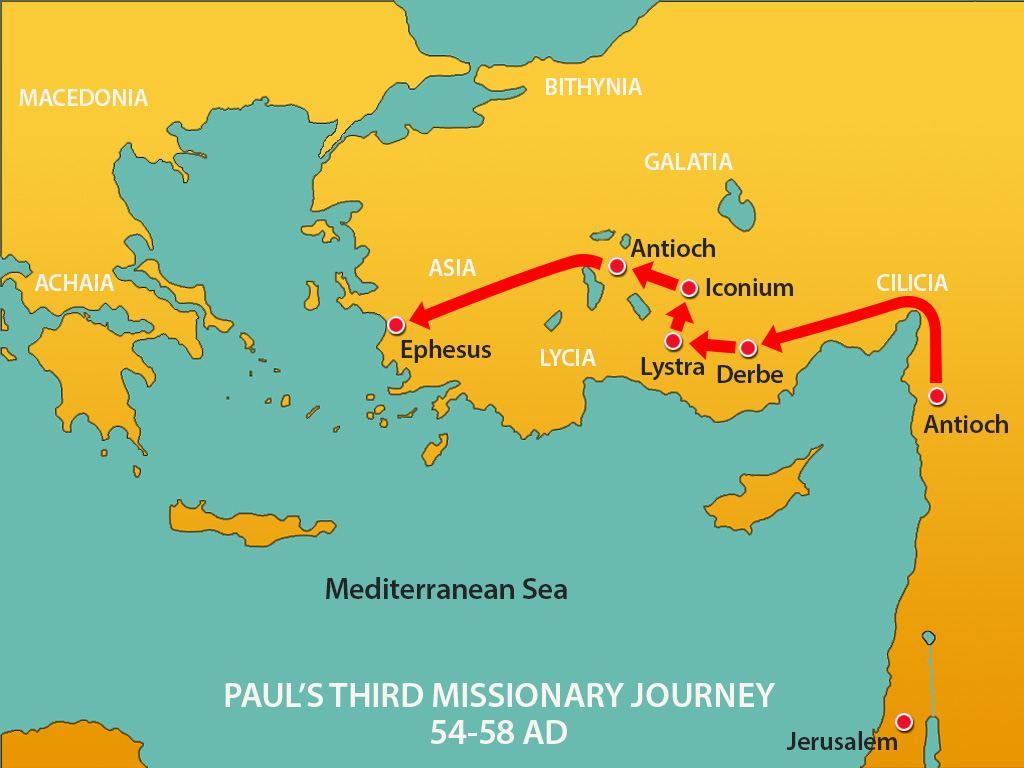Paul’s Third Missionary Journey

Opening Scripture: Acts 19:1-7
While Apollos was at Corinth, Paul took the road through the interior and arrived at Ephesus. There he found some disciples and asked them, “Did you receive the Holy Spirit when you believed?” They answered, “No, we have not even heard that there is a Holy Spirit.” So Paul asked, “Then what baptism did you receive?” “John’s baptism,” they replied. Paul said, “John’s baptism was a baptism of repentance. He told the people to believe in the one coming after him, that is, in Jesus.” On hearing this, they were baptized in the name of the Lord Jesus. When Paul placed his hands on them, the Holy Spirit came on them, and they spoke in tongues and prophesied. There were about twelve men in all.
MONDAY 6.27.22 Acts 18:23, 19:1-7
The Holy Spirit – Active Agent of New Life
Do you recall that on his second missionary journey, Paul wanted to go to Ephesus, but the Holy Spirit somehow kept him from it? He tried again on his third journey, and got there. Early on, he met some disciples whom John the Baptist (or a follower of his) had baptized. They didn’t know about Jesus or the Holy Spirit. Paul showed them that John had pointed forward to Jesus, and that the Holy Spirit’s power continues Jesus’ work in giving us a new inner life. Baptized in the name of Jesus, they began to experience that power.
- John the Baptist’s ministry was powerful (cf. Matthew 3:1-12), and not everyone who heard him or whom he baptized was present when he baptized Jesus. It makes sense that there were people who accepted John’s message about repentance but didn’t know all about Jesus’ life, teaching, and resurrection. How fully do you understand your faith? What helps you to keep deepening that understanding, and experiencing the Spirit’s life-changing power?
- Scholar N. T. Wright noted, “Luke does not say that tongues always accompany such baptism.” (In fact, he wrote the opposite in a letter to Corinth—cf. 1 Corinthians 12:27-30.) Wright added, “The main thing Luke is doing in this story is to introduce Paul’s work in Ephesus, and to show that … he was concerned with the spirit’s powerful work both in the lives of individuals and out into the wider community.” When have you sensed the difference between ministry or service done with purely human effort, and that done when the Spirit’s power is present?
Prayer: Lord Jesus, thank you for calling me, not just to repent over and over, but to keep growing through the power of the Holy Spirit working in my heart and my life. Amen.
TUESDAY 6.28.22 Acts 19:8-17
Two Years of Preaching in Ephesus
Ephesus was a major travel and commerce center (three main Roman roads ran through the city). Paul preached there for two years, first in the synagogue, then in Tyrannus’ lecture hall.
Luke said that after two years, “everyone living in the province of Asia—both Jews and Greeks— heard the Lord’s word.” Some traveling exorcists tried to “borrow” Jesus’ name as a gimmick. The results showed clearly that “Jesus” was not a magic word, but a real Lord to take seriously.
• Luke’s description of Paul’s ministry showed the presence of what we call “knowing God” (“convincing arguments”), “loving God” (“the Lord Jesus in the highest regard”) and “serving God” (“unusual miracles” of healing). In what ways have you been able to include all three dimensions in your faith journey? If one or two are weak, how might you allow God to strengthen them in you?
• Earlier in Acts, Luke told of a man named Simon who offered to buy the apostles’ power for his own use (cf. Acts 8:9-24). Here the exorcists just assumed that “Jesus” was a magic word—that all they had to do was repeat it, without any understanding or life commitment. Have you or someone you knew ever tried to invoke the name of Jesus to bail you out of a problem or crisis without a life commitment to his lordship?
Prayer: Living Lord, sometimes I’d like your power to work on my problems or challenges. Remind me that what I need most is your power at work inside me, rather than on the things outside me. Amen.
WEDNESDAY 6.29.22 Acts 19:18-22
Choosing the Gospel Over Sorcery
As in most major cities, many Ephesian citizens held political or economic power. Some also sought to exercise a more mystical kind of power, through the dark arts of sorcery or magic. But a greater power—the greatest power—had come to town. Luke wrote, “The Lord’s word grew abundantly and strengthened powerfully.” One sign was that people who believed Paul’s message then got rid of sorcery scrolls worth roughly 50,000 days’ wages!
- Jesus often stood what seems to us like economic “common sense” on its head (cf. Matthew 6:25-34, Luke 19:1-10). There’s no hint that the Ephesian believers thought of re-selling their sorcery texts to others, despite their great value in a world where scrolls were hand-copied rarities. Have you ever had to “burn” anything of value in order to follow God faithfully? If so, was it worth whatever the economic cost?
- Ephesus (and the whole Greco-Roman world) had limited medical expertise, even less emotional awareness, and served a pantheon of fickle gods who seemed to harm humans more than they helped. Finding Jesus’ power, many of them broke cleanly from their past. Scholar William Barclay wrote, “It is all too true that many of us hate our sins but either we cannot leave them at all or we do so with a lingering and backward look. There are times when only the clean and final break will suffice.” Is there any place in your life where you need to make a clean, final break from something hurtful and wrong?
Prayer: Lord Jesus, Ephesus was a center of power, and Paul was a traveling, tent-making preacher. Let his power, your power, be the kind of power I seek, a power than can truly change the world by changing hearts. Amen.
THURSDAY 6.30.22 Acts 19:23-41
A Riot about Artemis (or about money)
When some Ephesians burned their sorcery scrolls, they set the stage for real trouble. Some Ephesian silversmiths who made profitable temple and goddess statues were furious. They rioted because Paul taught, “Gods made by human hands aren’t really gods.” Their leader Demetrius claimed their protest was about reverence for the “great goddess Artemis” (verse 27). But his real concern showed in verse 25: “you know that we make an easy living from this business.”
- The theater in Ephesus seated about 25,000 people, and it was full of angry people shouting, “Great is Artemis of the Ephesians!” Yet Luke wrote, “Paul wanted to appear before the assembly.” In this case, disciples and government officials kept him from taking the risk, but Paul wanted to seize any chance to talk to people about Jesus. What risks of any kind are you willing to take for Jesus? Have you ever been like the disciples and government officials, helping someone else avoid a foolish risk?
- Demetrius cleverly exploited the human tendency to favor what is “ours” over anything we see as “foreign.” To his fellow craftsmen, he talked about profits, but he got the mob to defend “their” local goddess Artemis. Have you ever seen hometown pride or patriotism turn into a mindless, irrational defense of “ours” over “theirs”? How can we love our city and country without absurdly assuming that “ours” is always better, just because it’s “ours”?
Prayer: Lord Jesus, keep me from becoming a Demetrius, protecting his profits by appealing to the worst in people. Help me keep growing like Paul, a person passionately committed to serving and sharing you everywhere. Amen.
FRIDAY 7.1.22 Acts 20:1-12
Revisiting Macedonia and Troas
After the riot led by silversmiths, Paul left Ephesus. He spent three months in Macedonia and Greece, strengthening the churches there. He was determined to go to Jerusalem, taking an offering from the Gentile churches to help poverty-stricken Jewish Christians as a sign of the unity of all believers (cf. 2 Corinthians 8-9, probably written from Ephesus). In Troas, God’s power used Paul as its instrument to give life back to a young man who fell after dozing off during a long discussion.
- We sometimes picture Paul as a “lone wolf,” a solitary hero. In verse 6 of today’s reading, Luke listed the names of six different people who were traveling with Paul at this time. It turns out Paul was a team builder and tireless mentor. He knew he had much to share with others, and that he needed them to help make his work effective. How good are you at enlisting the gifts of others to work with you in serving God?
- Luke wrote that in Troas Paul, in “a discussion” (don’t you wish Luke had said what it was about?) talked “until midnight,” and then “right up until daybreak.” Yet when the young man Eutychus fell asleep and took a potentially disastrous fall, Paul didn’t scold him, but called on God’s power to restore him to life and health. Next time you get restless because a sermon has gone beyond 30 minutes, remember Paul at Troas!
Prayer: Lord Jesus, guide me to the people who can make my service stronger. Keep me aware of the people I can bless, encourage and guide on their journey. Let your life-giving power flow through me. Amen.
SATURDAY 7.2.22 Acts 20:13-38
Paul’s Heartfelt Farewell to the Ephesian Elders
As he set out for Jerusalem, Paul asked the Ephesian church elders to meet him in a nearby port city. He reviewed the essential principles of his time with them and urged them to keep on serving Christ as faithfully as he always tried to. It was an emotional meeting. Paul had a strong sense that his enemies were likely to be stronger in Jerusalem than in any of the other cities where he had preached. The Ephesians wept as he told them, “I know that none of you will see me again.”
- Paul wrote to the Corinthians (again, probably from Ephesus) about a crisis in Asia in which he was afraid he might not survive (cf. 2 Corinthians 1:8-10). Luke didn’t describe that crisis in Acts, but he quoted Paul as saying in this farewell speech, “I served the Lord with great humility and with tears in the midst of trials that came upon me because of the Jews’ schemes” (verse 19). Then Paul added, “I’m going to Jerusalem. I don’t know what will happen to me there. What I do know is that the Holy Spirit testifies to me from city to city that prisons and troubles await me” (verses 22, 23). Remember, people who change the world don’t quit. Where is God calling you to exercise perseverance and hope in the face of difficulty right now?
Prayer: Dear Jesus, thank you for standing by Paul, whose life and writings bless and inspire me. Give me something of his courage and faith, as I do whatever you set before me. Amen.

